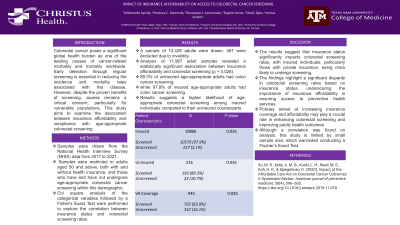Tuesday Poster Session
Category: Colorectal Cancer Prevention
P3859 - Impact of Insurance Affordability on Access to Colorectal Cancer Screening
Tuesday, October 29, 2024
10:30 AM - 4:00 PM ET
Location: Exhibit Hall E

Has Audio
- AA
Adebolanle Ayinde, MD, MPH
CHRISTUS Health | Texas A&M School of Medicine
Longview, TX
Presenting Author(s)
Adebolanle Ayinde, MD, MPH1, Ifeoluwa C. Daramola, BSc, MPH, MD2, Oluwatayo J. Awolumate, MD3, Eugene Annor, MD, MPH4, Olachi Egbo, MD5, Joshua Eyitemi, MD, MPH, MS6
1CHRISTUS Health | Texas A&M School of Medicine, Longview, TX; 2Cypress Internal Medicine, Swift Current, SK, Canada; 3Howard University Hospital, Washington, DC; 4University of Illinois College of Medicine, Morton, IL; 5Aurora Medical Center, Oshkosh, WI; 6Saskatchewan Health Authority, Swift Current, SK, Canada
Introduction: Colorectal cancer poses a significant global health burden as one of the leading causes of cancer-related morbidity and mortality worldwide. Early detection through regular screening is essential in reducing the incidence and mortality rates associated with the disease. However, despite the proven benefits of screening, access remains a critical concern, particularly for vulnerable populations. This study aims to examine the association between insurance affordability and compliance with age-appropriate colorectal screening.
Methods: Using the National Health Interview Survey (NHIS) data from 2017 to 2021,we sampled adults aged 50 and above, both with and without health insurance, and those who have and have not undergone age-appropriate colorectal cancer screening within this demographic. We conducted a chi square analysis of the categorical variables and further performed a Fisher's Exact Test to explore the correlation between insurance status and colorectal screening rates.
Results: A total of 12,428 adults were included in this study. Our analysis revealed a statistically significant association between insurance affordability and colorectal screening (p = 0.026). 89.3% of uninsured age-appropriate adults had colon cancer screening, while 97.9% of insured age-appropriate adults had colon cancer screening. This suggests a higher likelihood of age-appropriate colorectal screening among insured individuals compared to their uninsured counterparts.
Discussion: The results suggest that insurance status significantly impacts colorectal screening rates, with insured individuals, particularly those with private insurance, being more likely to undergo screening. The findings highlight a significant disparity in colorectal screening rates based on insurance status, underscoring the importance of insurance affordability in ensuring access to preventive health services. Policies aimed at increasing insurance coverage and affordability may play a crucial role in enhancing colorectal screening and improving public health outcomes.
Disclosures:
Adebolanle Ayinde, MD, MPH1, Ifeoluwa C. Daramola, BSc, MPH, MD2, Oluwatayo J. Awolumate, MD3, Eugene Annor, MD, MPH4, Olachi Egbo, MD5, Joshua Eyitemi, MD, MPH, MS6. P3859 - Impact of Insurance Affordability on Access to Colorectal Cancer Screening, ACG 2024 Annual Scientific Meeting Abstracts. Philadelphia, PA: American College of Gastroenterology.
1CHRISTUS Health | Texas A&M School of Medicine, Longview, TX; 2Cypress Internal Medicine, Swift Current, SK, Canada; 3Howard University Hospital, Washington, DC; 4University of Illinois College of Medicine, Morton, IL; 5Aurora Medical Center, Oshkosh, WI; 6Saskatchewan Health Authority, Swift Current, SK, Canada
Introduction: Colorectal cancer poses a significant global health burden as one of the leading causes of cancer-related morbidity and mortality worldwide. Early detection through regular screening is essential in reducing the incidence and mortality rates associated with the disease. However, despite the proven benefits of screening, access remains a critical concern, particularly for vulnerable populations. This study aims to examine the association between insurance affordability and compliance with age-appropriate colorectal screening.
Methods: Using the National Health Interview Survey (NHIS) data from 2017 to 2021,we sampled adults aged 50 and above, both with and without health insurance, and those who have and have not undergone age-appropriate colorectal cancer screening within this demographic. We conducted a chi square analysis of the categorical variables and further performed a Fisher's Exact Test to explore the correlation between insurance status and colorectal screening rates.
Results: A total of 12,428 adults were included in this study. Our analysis revealed a statistically significant association between insurance affordability and colorectal screening (p = 0.026). 89.3% of uninsured age-appropriate adults had colon cancer screening, while 97.9% of insured age-appropriate adults had colon cancer screening. This suggests a higher likelihood of age-appropriate colorectal screening among insured individuals compared to their uninsured counterparts.
Discussion: The results suggest that insurance status significantly impacts colorectal screening rates, with insured individuals, particularly those with private insurance, being more likely to undergo screening. The findings highlight a significant disparity in colorectal screening rates based on insurance status, underscoring the importance of insurance affordability in ensuring access to preventive health services. Policies aimed at increasing insurance coverage and affordability may play a crucial role in enhancing colorectal screening and improving public health outcomes.
Disclosures:
Adebolanle Ayinde indicated no relevant financial relationships.
Ifeoluwa Daramola indicated no relevant financial relationships.
Oluwatayo Awolumate indicated no relevant financial relationships.
Eugene Annor indicated no relevant financial relationships.
Olachi Egbo indicated no relevant financial relationships.
Joshua Eyitemi indicated no relevant financial relationships.
Adebolanle Ayinde, MD, MPH1, Ifeoluwa C. Daramola, BSc, MPH, MD2, Oluwatayo J. Awolumate, MD3, Eugene Annor, MD, MPH4, Olachi Egbo, MD5, Joshua Eyitemi, MD, MPH, MS6. P3859 - Impact of Insurance Affordability on Access to Colorectal Cancer Screening, ACG 2024 Annual Scientific Meeting Abstracts. Philadelphia, PA: American College of Gastroenterology.
